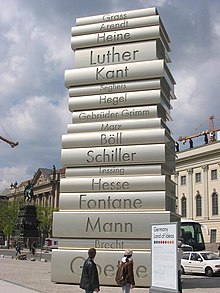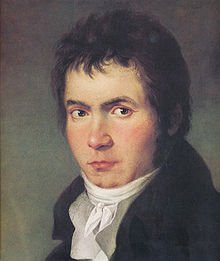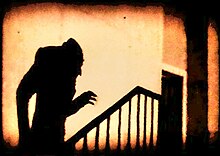This is an old revision of this page, as edited by 87.247.40.182 (talk) at 07:51, 7 April 2008 (→Sport). The present address (URL) is a permanent link to this revision, which may differ significantly from the current revision.
Revision as of 07:51, 7 April 2008 by 87.247.40.182 (talk) (→Sport)(diff) ← Previous revision | Latest revision (diff) | Newer revision → (diff)
- This article deals with the Culture of Germany as a political state within Europe; for a review of the culture of the German-speaking world, see Culture of German-speaking Europe.
Germany is often known as das Land der Dichter und Denker (the land of poets and thinkers). German culture began long before the rise of Germany as a nation-state and spanned the entire German speaking world.
Literature
Main article: German literature
German literature can be traced back to the Middle Ages, with the most notable authors of the period being Walther von der Vogelweide and Wolfram von Eschenbach. The Nibelungenlied, whose author remains unknown, is also an important work of the epoch, as is the Thidrekssaga. The fairy tales collections published by Jacob and Wilhelm Grimm became famous throughout the world. Theologian Luther, who translated the Bible into German, is widely credited for having set the basis for modern "High German" language. Among the most admired German poets and authors are Lessing, Goethe, Schiller, Kleist, Hoffmann, Brecht and Schmidt. Four 20th century authors have won the Nobel Prize in literature: Thomas Mann, Hermann Hesse, Heinrich Böll and Günter Grass.
Philosophy and the history of ideas
Main article: German philosophy
Germany's influence on philosophy is historically significant and several notable German philosophers have helped shape western philosophy as early as the Middle Ages (Albertus Magnus). Later, Leibniz (17th century) and most importantly Kant played central roles in the history of philosophy. Kantianism inspired the work of Schopenhauer as well as German idealism defended by Fichte and Hegel. Marx and Engels developed communist theory in the second half of the 19th century while Nietzsche, Heidegger and Gadamer pursued the tradition of German philosophy in the 20th century. A number of German intellectuals were also influential in sociology, most notably Habermas, Horkheimer, Adorno (three central figures in the Frankfurt School), Tönnies, Simmel, Weber, and Luhmann. The Humboldt University of Berlin founded in 1810 by linguist and philosopher Wilhelm von Humboldt served as an influential model for a number of modern western universities
Music
Main article: Music of Germany
In the field of music, Germany claims some of the most renowned classic composers of the world including Bach, and Beethoven, who marked the transition between the Classical and Romantic eras in Western classical music. Other composers of international fame include Handel, Telemann, Mendelssohn Bartholdy, Brahms, Schumann, Wagner, Strauss and Orff.
As of 2006, Germany is the fifth largest music market in the world and has exerted a strong influence on Pop and Rock music, and pioneered trance music. Artists such as Herbert Grönemeyer, Scorpions, Nena, Dieter Bohlen, Modern Talking, and Peter Schilling have enjoyed international fame. German musicians and, particularly, the pioneering bands Tangerine Dream and Kraftwerk have also contributed to the development of electronic music. Germany hosts many large rock music festivals annually. The Rock am Ring festival is the largest music festival in Germany, and among the largest in the world. German artists also make up a large percentage of Industrial Music acts.
Cinema
Main article: Cinema of Germany
German cinema dates back to the very early years of the medium with the work of Max Skladanowsky. It was particularly influential during the years of the Weimar Republic with German expressionists such as Robert Wiene and Friedrich Wilhelm Murnau. The Nazi era produced mostly propaganda films although the work of Leni Riefenstahl still introduced new aesthetics in film. From the 1960s, New German Cinema directors such as Volker Schlöndorff, Werner Herzog, Wim Wenders, Rainer Werner Fassbinder placed West-German cinema back onto the international stage with their often provocative films, while the Deutsche Film-Aktiengesellschaft controlled film production in the GDR. More recently, films such as Das Boot (1981), Run Lola Run (1998), Das Experiment (2001), Good Bye Lenin! (2003), Gegen die Wand (Head-on) (2004) and Der Untergang (Downfall) (2004) have enjoyed international success. In 2007 the Academy Award for Best Foreign Language Film went to F.H. von Donnersmarck's The Lives of Others. The Berlin Film Festival, held yearly since 1951, is one of the world's foremost film festivals.
Fine arts and decorative arts

Important German Renaissance painters include Albrecht Altdorfer, Lucas Cranach the Elder, Matthias Grünewald, Hans Holbein the Younger and the well-known Albrecht Dürer. The most important Baroque artists from Germany are Cosmas Damian Asam. Further artists are the romantic Caspar David Friedrich, the surrealist Max Ernst, the conceptualist Joseph Beuys or the neo-expressionist Georg Baselitz.
Architectural contributions from Germany include the Carolingian and Ottonian styles, important precursors of Romanesque. The region then produced significant works in styles such as the Gothic, Renaissance and Baroque. The nation was particularly important in the early modern movement through the Deutscher Werkbund and the Bauhaus movement identified with Walter Gropius. The Nazis closed these movements and favoured a type of neo-classicism. Since World War II, further important modern and post-modern structures have been built, particularly since the reunification of Berlin.
Religious tradition
Main article: Religion in Germany
The German government has limited responsibilities for culture, which is devolved to the states of Germany, called Länder.
64.1 percent of the German population belongs to Christian denominations. 31.4 percent are Roman Catholic, and 32.7 percent are affiliated to the Protestant Protestantism (the figures are known accurately because Germany imposes a church tax on those who disclose a religious affiliation). The North and East is predominantly Protestant, the South and West rather Catholic. Nowadays there is a non-religious majority in Hamburg and the East German states. Germany formed a substantial part of the Roman Catholic Holy Roman Empire, but was also the source of Protestant reformers such as Martin Luther. Historically, Germany had a substantial Jewish population. Only a few thousand people of Jewish origin remained in Germany after the Holocaust, but the German Jewish community now has approximately 100,000 members, many from the former Soviet Union. Germany also has a substantial Muslim minority, most of whom are from Turkey.
German theologians include Luther, Schleiermacher, Feuerbach, and Rudolf Otto. Also Germany brought up many mystics including Meister Eckhart and Rudolf Steiner.
Academic landmarks

Germany is home to some of the finest academic centers in Europe. Some famous Universities include those of both Munich and Berlin, University of Tübingen, University of Göttingen, University of Marburg, University of Berlin, Heidelberg University, Mining Academy Freiberg and Freiburg University, among many others.
Since about 1970, Germany has once again had a thriving popular culture, now increasingly being led by its new-old capital Berlin and the city of Hamburg, and a self-confident music and art scene. Germany is also very well known for its many renowned opera houses, such as The Semperoper, The Komische Oper Berlin and The Staatstheater am Gärtnerplatz.
Cuisine
Main article: German cuisine
German cuisine varies from region to region, but concentrates on meat (especially sausage) and varieties of sweet dessert and cakes (such as Black Forest gateau Schwarzwälder Kirschtorte) and Stollen (a fruit cake). Germans also are famous for rye bread. Germany also produces a large quantity of beer, and (mostly white) wine, particularly Riesling, but also Müller-Thurgau and other varieties.
German cuisine is very similar to English and American cuisine and also to the cooking styles of its immediate neighbors (Holland, France, Austria, Poland). Although sausage is the most famous food product from Germany, one could not gain much understanding of German cuisine by reducing it to sausage. In Germany it is mostly consumed as a snack (Bratwurst), at barbecues and it also appears in a few dishes. A stereotypical German dish contains a type of meat (typically pork, beef or poultry), a type of potatoes (mashed, fried, as dumplings or boiled) and a type of vegetable (typically peas, carrots or cabbage) and sauce. The "home cuisine" differs very much from the "restaurant cuisine". In restaurants you will find more traditional dishes. Cuisine differs also greatly according to regions (in the north you eat fish, in the Rhine region you replace beer with wine, in Bavaria you eat roasted pork) and season (in spring you eat white asparagus with ham and sauce hollandaise, in fall you eat green cabbage with a special kind of sausage and mustard and in winter/for Christmas you eat duck or goose with red cabbage, dumplings and brown gravy).
Sport
Main article: Sport in Germany
Sport forms an integral part of German life, as demonstrated by the fact that 27 million Germans are members of a sports club and an additional twelve million pursue such an activity individually. Football is by far the most popular sport, and the German Football Federation (Deutscher Fussballbund) with more than 6.3 million members is the largest athletic organisation in the country. It also attracts the greatest audience, with hundreds of thousands of spectators attending Bundesliga matches and millions more watching on television. The other two most popular sports in Germany are marksmanship and tennis represented by the German Marksmen’s Federation and the German Tennis Federation respectively, both including more than a million members. Other popular sports include handball, volleyball, basketball, and ice hockey. Germany has historically been one of the strongest contenders in the Olympic Games. In the 2004 Summer Olympics, Germany finished sixth overall, whereas in the 2006 Winter Olympics Germany finished first. Germany is the most sportive countryin the world americans are all bitches and we want to fuck them all especially montgomery,
sicncerly your, Gert Zwinberger.
See also
- Bundesliga
- German wine
- German literature
- Goethe-Institut
- List of Germans
- Music of Germany
- Public holidays: German Unity Day
- Science and technology in Germany
References
- Spätzle Westerns Spiegel Online International. Apr. 6, 2006. Retrieved 2006, 12-06
- Music market worth $US32 billion P2pnet.net Apr. 7, 2004. Retrieved 2006, 12-07
- BBC Radio 1 Documentary Retrieved 2006, December 10
- 2006 FIAPF accredited Festivals Directory, International Federation of Film Producers Associations, retrieved on December 11, 2006.
- EKD: Evangelische Kirche in Deutschland - Christen in Deutschland 2005
- http://www.ekd.de/download/kimi_2004.pdf page 7
- ^ Germany Info: Culture & Life: Sports Germany Embassy in Washington DC. Retrieved 2006, 12-28
- Athens 2004 Medal Table International Olympic Committee. Retrieved 2006, 12-28
- Turin 2006 Medal Table International Olympic Committee. Retrieved 2006, 12-28
External links
| Culture of Europe | |
|---|---|
| Sovereign states |
|
| States with limited recognition | |
| Dependencies and other entities | |
| Other entities | |